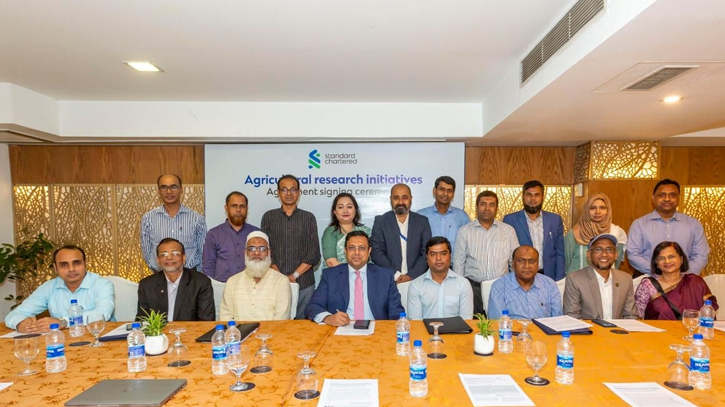
Photo : Courtesy
Standard Chartered Bangladesh has unveiled seven new agricultural research initiatives aimed at driving innovation and fostering community engagement in the country’s agricultural sector. These research projects are part of the Bank’s ongoing efforts to support and enhance research in agriculture, focusing on productivity, mechanization, and post-harvest management.
The seven selected research initiatives focus on a wide range of critical areas within Bangladesh agricultural landscape. These include developing climate-resilient crops such as nutrient-rich carrots and tomatoes, enhancing mango production through environmentally conscious pest management, and expanding rice irrigation in off-grid areas using solar-powered systems.
Other projects aim to reduce dependency on commercial feed in aquaculture by introducing plant-based alternatives, improve Boro rice cultivation through IoT-based water management, enhance crop resilience in saline-affected coastal region through indigenous fungi induced fertilisation, and enhancing dairy production through advanced heat stress management and early pregnancy detection technologies. Collectively, these projects represent innovative solutions to pressing challenges in food security, productivity, and sustainable farming through practices that are environment-friendly.
Naser Ezaz Bijoy, Chief Executive Officer, Standard Chartered Bangladesh, said, “Through these agricultural research initiatives, we are addressing some of the most pressing challenges faced by the sector, from food security and climate resilience to technological innovation. By leveraging the expertise of our Jury Panel and working alongside leading researchers, we are confident that these projects will make a significant impact, enhancing productivity, sustainability, and the livelihoods of countless individuals across the country.”
He added, “I would like to extend my heartfelt thanks to our Jury Panel for their valuable insights and dedication, and to the brilliant researchers whose work will be instrumental in shaping the future of agriculture in Bangladesh. We are proud to play a part in driving transformative change in the sector, ensuring a brighter, more resilient future.
To ensure the selection of the most impactful projects, the Bank assembled a five-member Jury Panel of distinguished agricultural experts. Following a rigorous evaluation process, seven initiatives were selected based on their potential to significantly contribute to the sector’s growth, food security, and sustainability. Each project addresses critical challenges in Bangladesh’s agriculture, aiming to bring about transformative change.
The selected initiatives are :
1. Developing and upscaling nutrient-rich carrots and tomatoes for growth in stressful environments to enhance food security in Bangladesh, led by Dr. Harun Ar Rashid, Bangladesh Agricultural University
2. Increasing safe mango production by mitigating fruit fly infestations, led by Dr. Abul Manjur Khan, Bangladesh Agricultural University
3. Unlocking the potential of climate-smart solar pump irrigation systems to increase irrigated Boro rice command areas in off-grid haors, led by Dr. Mizanur Rahman, Bangladesh Agricultural University
4. Reducing dependence on commercially available feed in Bangladesh’s aquaculture sector by developing alternative, fermented plant-based feeds in polyculture systems, led by Dr. S M Rafiquzzaman, Bangabandhu Sheikh Mujibur Rahman Agricultural University
5. Scaling up the use of IoT-based automated alternate wetting and drying systems for rice cultivation, led by Dr. Mostafizar Rahman, Bangabandhu Sheikh Mujibur Rahman Agricultural University
6. Enhancing crop resilience in saline-affected coastal regions by applying a novel fungus-containing bio-fertilizer and nano urea, led by Dr. Rakibul Islam, University of Dhaka
7. Improving dairy production by mitigating heat stress, using IoT-based temperature sensors and ultrasonography, led by Dr. Rashedul Islam, Sher-e-Bangla Agricultural University
The Jury Panel was led by Professor AKM Nowsad Alam, Ph.D., Dean, Faculty of Fisheries, Bangladesh Agriculture University. Other members include Professor Md. Rostom Ali, Ph.D., Department of Farm Power and Machinery, Bangladesh Agriculture University; Professor Mirza Hasanuzzaman, Ph.D., Department of Agronomy, Faculty of Agriculture, Sher-e-Bangla Agriculture University; Professor KBM Saiful Islam, Ph.D., Dean, Faculty of Animal Science Veterinary Medicine (FASVM), Sher-e-Bangla Agriculture University and Professor Mashura Shammi, Ph.D., Department of Environmental Science, Jahangirnagar University.
With over 119 years of commitment to Bangladesh’s growth, Standard Chartered continues to champion initiatives that promote sustainable development in critical sectors like agriculture. The Bank remains dedicated to investing in communities, expanding services, and creating new opportunities for stakeholders, all while fostering inclusive and sustainable growth in Bangladesh’s agricultural landscape.
Messenger/Tareq








